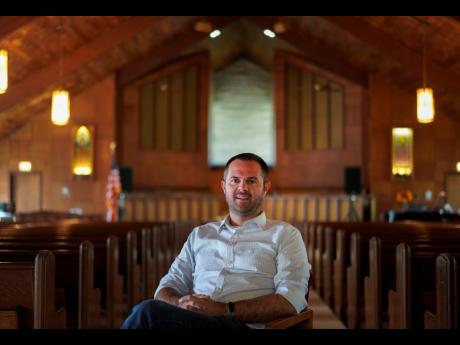The decline in religious affiliation
AP:
They gathered one last time on Sunday — the handful of mostly elderly members of First Baptist Church in Mt Vernon, Illinois.
The members, joined by well-wishers, said the Lord’s Prayer, recited the Apostle’s Creed and heard a biblical passage typically used at funerals, “To everything there is a season ... a time to be born, and a time to die.” They sang classic hymns – Amazing Grace, It Is Well With My Soul and, poignantly, God Be With You Till We Meet Again.
Afterward, members voted unanimously to close the church, a century and a half after it was created by hardscrabble farmers in this southern Illinois community of about 14,000 people.
Many US churches close their doors each year, typically with little attention. But this closure has a poignant twist.
First Baptist’s pastor, Ryan Burge, spends much of his time as a researcher documenting the dramatic decline in religious affiliation in recent decades. His recent book, The Nones, talks about the estimated 30 per cent of American adults who identify with no religious tradition.
He uses his research in part to help other pastors seeking to reach their communities, and he’s often invited to fly around the country and speak to audiences much larger than his weekly congregation.
But it’s no academic abstraction. Burge has witnessed the reality of his research every Sunday morning in the increasingly empty pews of the spacious sanctuary, which was built for hundreds in the peak churchgoing years of the mid-20th century.
“It’s this odd thing, where I’ve become somewhat of an expert on church growth, and yet my church is dying,” said Burge, a political science professor at Eastern Illinois University. “A lot of what I do is trying to figure out how much I am to blame for what’s happened around me.”
Burge, 42, started leading the congregation in 2006, when “there were about 50 people on a good Sunday,” he recalled. In the years since, he’s earned his doctorate and begun working as a professor. He’s gained a wide online and print readership, in part by converting dense statistical tables into easy-to-comprehend graphics on religious trends.
All this time, he’s continued to pastor the small church.
“I’m willing to admit that I’m not as good as I could be or should be” as a pastor, he said. “But I’m also not willing to admit that it’s 100 per cent my fault. If you look at the macro level trends happening in modern American religion, it’s hard to grow a church in America today, regardless of what your denomination is. And a lot of places have way more headwinds than tailwinds.”
The church’s American Baptist denomination is part of a cluster of so-called mainline denominations – Episcopal, Methodist, Presbyterian, Lutheran and others that were once central in their communities but have been dramatically shrinking in numbers. The nation’s largest evangelical denomination, the Southern Baptist Convention, has also been losing members.

